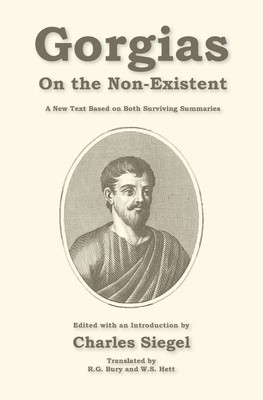
- We will send in 10–14 business days.
- Publisher: Omo Press
- ISBN-10: 1941667597
- ISBN-13: 9781941667590
- Format: 13.3 x 20.3 x 0.3 cm, mīksti vāki
- Language: English
- SAVE -10% with code: EXTRA
On the Non-Existent (e-book) (used book) | bookbook.eu
Reviews
Description
Gorgias was one of the earliest Sophists, famous for his flowery rhetorical style, which we see in two of his three surviving works. But On the Non-Existent, his third surviving work, is very different, written in a dense, philosophical style.
The introduction to this book explains that we can understand the work as a parody of the Eleatics. Among the earliest of the pre-Socratic philosophers, the Eleatics believed that the world we perceived was an illusion, and all that really existed was an unchanging, eternal world that they called "the One." The Sophists believed the opposite, that there is no transcendent, eternal truth, that we cannot know anything beyond what we perceive, and that everyone's subjective perceptions are equally valid. To parody the Eleatics' arguments that the world we perceive does not exist, Gorgias comes up with similar proofs that nothing exists. Little survives from pre-Socratic philosophy, so this book adds significantly to our understanding of the Eleatics. Toward the end, Gorgias also talks about subjective perception, adding significantly to our understanding of the Sophists. On the Non-Existent survives in two summaries, one by Sextus Empiricus and one by Pseudo-Aristotle. For the first time, this text creates a text that combines these two summaries, the most complete text available of the work. In addition, it includes the two source texts on facing pages, laid out so the equivalent points in the two texts are across from each other, making it easy for readers to compare the source texts for themselves. It also adds subheadings, making it easier to follow the argument of the texts.EXTRA 10 % discount with code: EXTRA
The promotion ends in 21d.06:12:53
The discount code is valid when purchasing from 10 €. Discounts do not stack.
- Publisher: Omo Press
- ISBN-10: 1941667597
- ISBN-13: 9781941667590
- Format: 13.3 x 20.3 x 0.3 cm, mīksti vāki
- Language: English English
Gorgias was one of the earliest Sophists, famous for his flowery rhetorical style, which we see in two of his three surviving works. But On the Non-Existent, his third surviving work, is very different, written in a dense, philosophical style.
The introduction to this book explains that we can understand the work as a parody of the Eleatics. Among the earliest of the pre-Socratic philosophers, the Eleatics believed that the world we perceived was an illusion, and all that really existed was an unchanging, eternal world that they called "the One." The Sophists believed the opposite, that there is no transcendent, eternal truth, that we cannot know anything beyond what we perceive, and that everyone's subjective perceptions are equally valid. To parody the Eleatics' arguments that the world we perceive does not exist, Gorgias comes up with similar proofs that nothing exists. Little survives from pre-Socratic philosophy, so this book adds significantly to our understanding of the Eleatics. Toward the end, Gorgias also talks about subjective perception, adding significantly to our understanding of the Sophists. On the Non-Existent survives in two summaries, one by Sextus Empiricus and one by Pseudo-Aristotle. For the first time, this text creates a text that combines these two summaries, the most complete text available of the work. In addition, it includes the two source texts on facing pages, laid out so the equivalent points in the two texts are across from each other, making it easy for readers to compare the source texts for themselves. It also adds subheadings, making it easier to follow the argument of the texts.

Reviews